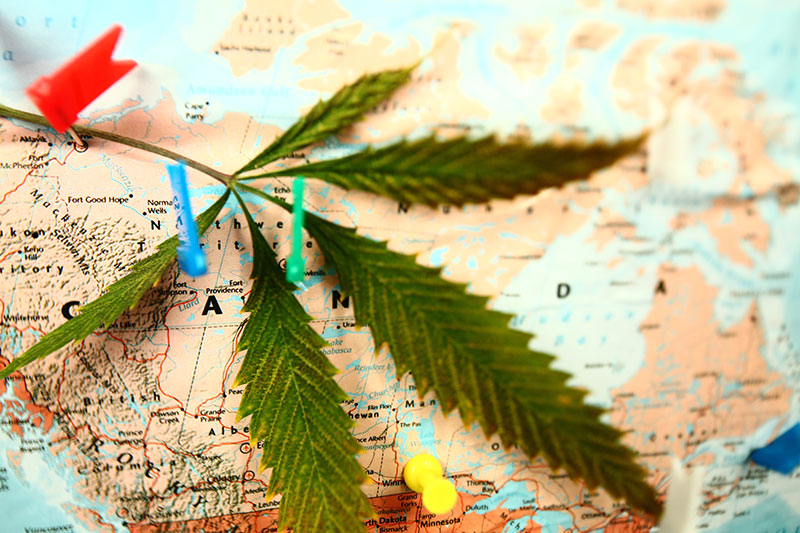The 7 most important countries in medical cannabis research

In recent years, the medical effects of cannabis have become increasingly important. In this article, you can find out which countries are at the forefront and which achievements we owe to them.
Cannabis and its medicinal effects
For a long time, the medicinal effects of the cannabis plant went unnoticed. But this has changed in recent decades. It has become clear that this plant has enormous medicinal potential. The list of diseases for which it helps or at least brings relief is almost endless. Even for patients, such as children, who do not want psychoactive effects, there are now medicines derived from the cannabis plant. These remedies have a high CBD content and do not have a psychoactive effect, but still have enormous medical benefits. They can tremendously reduce seizures in epilepsy patients, help with chronic pain, arthritis, cancer and chemo patients with their nausea. Likewise, THC and CBD can also help with mental illnesses such as depression or post-traumatic stress disorder. As mentioned before, the list here could go on forever, even though many patients still encounter prejudice. Research is helping to change this image of the often underestimated medicinal plant for the better and thus help patients.
We owe this development to a few countries that made and still make it possible for scientists and medical practitioners to further research the medicinal effects. As cannabis is considered an illegal drug in most countries, this has not always been easy. In many countries this is still the case, but more and more are also rethinking and recognising the medicinal effects of cannabis. In Germany, too, it has now been partially legalised for medical purposes. Patients with an appropriate prescription can finally get their medicine legally. In order to make decriminalisation possible for patients and to show other countries a better picture of the plant, sustainable and serious research work is needed.
But now to the countries to which you owe this development. These seven countries have contributed to the fact that many people are much better off today. Through them, we keep getting new insights into this wonderfully versatile plant. They are the ones who set a good example and thus bring about change.
1. Israel

Israel is the pioneer among countries involved in medical cannabis research. More precisely, it was the Israeli Raphael Mechoulam who did the pioneering work. Some 50 years ago, it was he, a researcher at the Hebrew University of Jerusalem, who first isolated the active ingredient THC from cannabis. He also managed to produce cannabidiol (CBD) synthetically for the first time in the first study on the effect of CBD on epilepsy patients. The discovery of the endocannbinoid system of our nervous system also goes back to Mechoulam.
When he realised that cannabis had never been broken down into its component parts, he discovered his passion, which he never lost. He has not stopped his research to this day. He is currently working with a team to research cannabis in the treatment of asthma patients. He is also not entirely innocent of the fact that the hemp industry is flourishing in Israel. For many, he is therefore an idol in research on the medicinal plant cannabis. By the way, he got his first samples for research by simply calling the police. The police chief always gave him something from the evidence room. At that time, the two of them were never aware that they were committing a crime.
The government of Israel is also very positive about medical cannabis research. For example, it started a programme that made it much easier for researchers and patients to access the medicine. In this way, numerous insights could be gained and Israel could set a good example. Many countries are therefore happy to turn to Israel when it comes to the topic of medical cannabis.
2. Czech Republic

In April 2013, the law legalising medicinal cannabis in the Czech Republic came into force. Since then, patients there can get a prescription from their doctor or, with prior registration, grow their own. However, the supply in pharmacies is still not ideal, as the prices are very high and medical cannabis is therefore not accessible for many patients. For patients, this often means that they have to get their cannabis more cheaply through illegal channels. However, the "street cannabis" is often not suitable for therapeutic purposes.
A separate institute was founded for medical research. In 2015, this was done by the Czech Ministry of Health, with the support of American organisations. Since then, the International Cannabis and Cannabinoids Institute (ICCI) in Prague has become an ideal research centre for medical cannabis. In cooperation with many other universities and companies, they want to further advance research and gain new insights.
3. Canada

In October 2018, cannabis lovers in Canada had a lot to celebrate, because cannabis was released for consumption by the government. But even in the past, people in Canada were not averse to the medicinal effects of cannabis. As early as the 90s, laws were being drafted to regulate the use of cannabis for patients. A few years ago, this was revised to also allow cultivation for patients. Now the government has not only legalised it completely, but also invested in 14 different research projects on the topic of medical cannabis. This support from the government has allowed some producers to grow into true giants.
Medical cannabis triggered a veritable gold rush there, whereby more and more types of medicines were developed. Pills, inhalers, ointments and the like were created in order to offer patients as many different ways of taking them as possible. The CEO of the Canadian biopharmaceutical company "Canopy Health" Marc Wayne said the following about this: " A lot of companies like Canopy Health are being founded and they will basically develop medical cannabis 2.0." His company is one of the already successful companies involved in the development of cannabis-based medicines.
In 2018, Tilray will also lead clinical trials on cannabis and its effects on symptoms of chronic obstructive pulmonary disease (COPD). This will include research into whether vaporised cannabis is suitable for bringing relief to patients. "If we conclude that vaporised cannabis is safe, good, tolerable and effective, we can do further research to help COPD patients and people with other diseases to effectively relieve their symptoms." Says Tilray's Head of Clinical Research, Dr Catherine Jacobson.
The country is preparing to become the world's largest case study on the benefits and risks of marijuana. The Canadian Centre on Substance Use and Addiction has set its national research agenda on the health effects of non-medical use. Their website says: "The report is a collaborative effort of the CCSA and nearly 50 experts and stakeholders from health care, law enforcement, prevention, academic and non-governmental organisations, and federal and provincial policies represented." These include the Canadian Institute of Health Research, the Canadian Academy of Health Sciences, Health Canada, Public Safety Canada and the US National Institute on Drug Abuse.
Some of the projects will study the effects on different groups such as pregnant women and adolescents, while other projects will look at the changes brought about by legalisation. These studies will be conducted in hospitals and universities across the country, among other places. Each site will receive a grant of $100,000 from the Canadian Institute of Health Research
4. spain

Although medical cannabis containing THC is not currently legalised in Spain, many marijuana research initiatives have already come out of the country.
In 1998, researchers at the Complutense University in Madrid discovered that THC can affect programmed cell death in brain tumour cells without negatively affecting the surrounding cells. In 2000, the same team tested rats and injected them with synthetic THC to treat brain tumours. This worked in one third of the rats and was able to prolong their lives by 6 weeks.
In 2002, the Spanish team, led by Dr Manuel Guzman, announced that they could destroy incurable brain tumours in rats by injecting THC. Recently, pharmacologist José-Carlos Bouso, along with other top scientists and researchers, founded the Spanish Observatory of Medical Cannabis (OECM). The organisation is made up of some of the best cannabis scientists. This scientific team includes the world-renowned marijuana scientist Raphael Mechoulam, who discovered THC and CBD. as well as Dr Franjo Grotenhermen.
The Observatory aims to promote the work of its members and also supports the ongoing research of other Spanish health professionals working on medicinal cannabis.
5. the netherlands

The Netherlands is known for being a haven for cannabis products. In Amsterdam, there are streets lined with the famous coffee shops. Due to the liberal attitude of the government towards cannabis, research has had an easy time here. Since 2003, patients have therefore been able to obtain medicinal cannabis from pharmacies under certain circumstances.
The Netherlands, along with Canada and Israel, is only one of three countries in the world with a nationally funded medical marijuana programme. The production of cannabis for medical purposes and research is controlled by the Bureau voor Medicinale Cannabis, which is under the Ministry of Health. Under certain circumstances, they issue a permit for research on cannabis.
The biggest company in the field of medical cannabis is Bedrocan. They currently hold the monopoly and are constantly conducting studies on the subject of cannabis and its medicinal effects. They also cooperate with many other research centres around the world. For example, the effect of vaporisation and subsequent inhalation of cannabis on fibromyalgia symptoms is currently being studied.
6. uruguay

Uruguay was the first country to legalise not only the consumption but also the production and sale of cannabis. In addition, they allow the export of medicinal cannabis. This circumstance could also quickly make Uruguay an important country in terms of research. President Tabaré Vázques himself announced the opening of a large private research and production facility for medical cannabis. However, there are complaints from researchers because, in their opinion, too little money is being invested in research despite the favourable legislation. With the legislation, however, it would not be surprising if more money for research would come from greater exports of medical cannabis. The market for medicinal cannabis products is growing and through the legislation Uruguay is able to grow into a major cannabis exporting country and at the same time provide an ideal environment for cannabis research. Uruguay encourages researchers to come to their country for cannabis research. Although there is still a lot to do here when it comes to cannabis research, it is one of the important countries in this field.
Uruguay's leaders have announced that they want to open up the country to research into medical marijuana.
7. USA

The US is also well on its way, with medical cannabis legalised in 33 states so far. 14 other states have more restrictive laws that limit THC content and focus primarily on access to CBD-containing products. In terms of medical cannabis laws, there are significant differences between states in terms of how it is produced and distributed, how it can be consumed and under what medical conditions it can be used. Cannabis research sometimes has to deal with major bureaucratic hurdles and still prejudices. This makes it difficult or impossible for small-scale studies to obtain approval for cannabis research. Nevertheless, there are countless scientific studies on the topic of medical cannabis. For example, it has been shown that the amount of opioids dispensed has decreased. Patients who benefited from the medicinal effects of cannabis thus visibly needed less strong painkillers.
As you can see, there are more and more countries that are researching medical cannabis. For some, research is still in its infancy, but more and more governments are recognising the enormous potential and medicinal effects of cannabis. It's about time this plant got the place in medicine it deserves. Surely we can expect some more new discoveries from these countries in the coming years. Besides THC and CBD, there are about a thousand other active substances that lie dormant in the cannabis plant and have not yet been researched.





